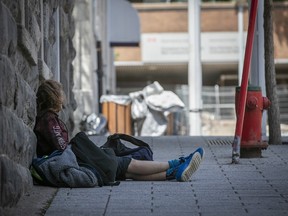Demands to move shelters and food-distribution initiatives out of the neighbourhood only serve to punish the victims.

Article content
The other day I got an earful of hate from a white man living in Complexe Guy-Favreau, a building that was the product of the destruction of one-third of Chinatown.
I was sitting next to another Guy-Favreau resident, age 92, who was enjoying a full-course meal she had been served by a volunteer group called Résiste à la rue, which has been serving free meals in Chinatown for several months.
Advertisement 2
Story continues below
Article content
She spoke with pride about her ability to speak French and her gratitude for the French-speaking volunteers who, seeing her disability, brought food to her every week instead of making her wait in line — but our conversation was interrupted by the angry man.
Evidently someone had told him I supported the volunteers distributing free food at noontime every Sunday, and he angrily insinuated that if I did not live in Chinatown, I had no right to express myself.
Well, I work in Chinatown, and that very morning I had observed a group of African asylum seekers waiting for a meal as early as 10:30 a.m.
Numerous people from all walks of life — those on fixed income, students, unhoused residents and Chinese seniors — have been lining up weekly for the free meals. It’s exactly the kind of initiative that merits public support in this time of crisis for so many people.
Instead, some area residents are complaining about the inconvenience and want the free food distribution to stop. A protest was organized last Sunday.
Food security is a major issue in Chinatown. The rents have become unaffordable for many. A senior I visited last month explained he received just over $1,600 a month in pension. His rent is $1,200, leaving him $400 for utilities, medication and food. No wonder his fridge was almost empty.
Article content
Advertisement 3
Story continues below
Article content
Another senior told me he ate one meal every three days.
Chinatowns in North America have long been places of refuge and mutual aid. Often considered on the margins of society, these areas are where unwanted Chinese immigrants, marginalized people, LGBTQ communities and sex workers have traditionally congregated.
It’s a shame the angry man did not take the time to talk to me. He would have learned that I am a nearly 60-year-old activist who has served the Chinese community for 35 years. That I am the coordinator of the Chinatown Round Table, which was created out of a year-long community consultation resulting in the City of Montreal’s Chinatown Action Plan for 2021-2026. That I might also be entitled to an opinion and have different knowledge to complement his.
The Chinatown ecosystem is complex and diverse. A solution for one sector may be a headache for another, and sometimes people will act in contradictory ways. I have seen the same Chinatown property owners complain about unhoused residents but actively participate in illegal evictions, thus increasing the numbers of homeless people on the streets.
I agree that residents who want shelters and food-distribution initiatives to be moved out of their area should not have to witness, daily at their doorsteps, the depth of human suffering caused by multiple crises — housing, opioids, poverty, climate — and a broken health care system.
But by getting in the way of their receiving basic necessities, they are only punishing the victims. Instead, they should go after the systems and governments responsible for the crises in the first place.
May Chiu is a Chinese community rights activist. She was among the community members who successfully won heritage designation for Chinatown, where her mother lived for 10 years.
Recommended from Editorial
Advertisement 4
Story continues below
Article content
Article content



Comments